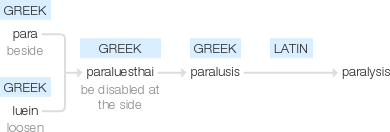Paralysis
late Old English, via Latin from Greek paralusis, from paraluesthai ‘be disabled at the side’, from para ‘beside’ + luein ‘loosen’.
wiktionary
Borrowed from Latin paralysis, from Ancient Greek παράλυσις(parálusis, “palsy”), from παραλύειν(paralúein, “to disable on one side”), from παρά(pará, “beside”) + λύειν(lúein, “loosen”). Doublet of palsy.
etymonline
paralysis (n.)
1520s, "impairment of the normal action of the nervous system in bringing body parts or organs into action," from Latin paralysis, from Greek paralysis "paralysis, palsy," literally "loosening," from paralyein "disable, enfeeble," from para- "beside" (see para- (1)) + lyein "loosen, untie" (from PIE root *leu- "to loosen, divide, cut apart"). Figurative meaning "loss of energy, loss of the power of performing regular functions" is from 1813. Earlier form was paralysie (late 14c., see palsy). Old English equivalent was lyft adl (see left (adj.)) or crypelnes "crippleness."
